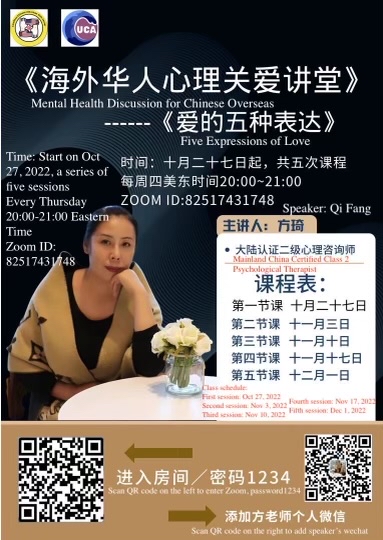Classes
Case 1
妻子逼着丈夫每天早上喝牛奶,使得不爱喝牛奶的丈夫痛苦不堪。
这妻子是在表达爱吗?
A wife forced her husband to drink milk every morning, which made the husband (who didn’t like milk) miserable. Is this wife expressing her love?
如果把案例中夫妻关系换成亲子关系,“被逼着喝牛奶”换成“去上父母认为必须上的补习班/课外活动”、“必须达到的成绩单”、“应该考上的大学”……这样的场景我们不是很熟悉吗?
If the husband-wife relationship in the case is replaced by a parent-child relationship, “being forced to drink milk” is replaced by “going to the cram school/extracurricular activities “, “report card grades that must be achieved”, “Universities that should be admitted to”… Aren’t we familiar with such scenes?
Case 2
The mother was very angry because the child missed a class, thinking that the child would make up the work for it quickly, but when she came home, she found that the child not only failed to make up the homework, but also made a mess in the kitchen. But the child just wanted to make a bowl of “ugly” noodles for the mother. The mother immediately became furious and scolded the child. As a result, the child ignored his mother for a week.
Is this mother wrong for caring about her child’s homework?
古人云:甲之熊掌,乙之砒霜。当我们竭尽全力去“爱”家人的时候,我们有没有想过,我们给出的“爱”,在对方眼中可能是枷锁,是命令,是控制,甚至是威胁,是毒药……
到底要用什么方式去“爱”才是最适合的呢?
The ancients said: ” One man’s meat is another man’s poison. ” When we try our best to “love” our family members, have we ever thought that the “love” we give may be a shackle, an order, a control, or even a threat, or a poison in the eyes of the other party…
What is the most suitable way to “love”?
著名心理咨询师方琦老师受南北卡华人社区服务中心(简称CCACC)和美国华人联合会精神健康项目组(简称UCA Waves)的特别邀请,从10月27日开始,为大家开设了一个《相爱不必相杀——爱的五种表达》的系列线上课程,用五节课来“破解爱的密码”。
The well-known psychological counselor Mrs. Fang Qi was specially invited by the North-South Carolina Chinese Community Service Center (CCACC) and the Mental Health Project Team of the United Chinese American Association (UCA Waves). Starting from October 27th, a series of online courses “Love does not have to kill each other – five expressions of love” have been opened for everyone, using five lessons to “crack the code of love”.
欢迎学员们扫码加入以下的”心理成长自助营“,分享自己的实践过程和反馈,共同成长。
Students are welcome to scan the QR code to join the following “Psychological Growth Self-help Camp”, share their practice process and feedback, and grow together.
方老师建议大家在听完本期视频后,完成以上作业,发到“心理成长自助营”群里,互相监督鼓励,这样可以帮助大家更好地理解课程的内容,把知识转化为能力。
第一节课 暖心的言语
The First Lesson -Warm Words
On October 27th (10.27.2022)
10月27日的第一节课,方老师带领大家一起通过分析案例探讨了爱的第一种表达——“暖心的言语”。
In the first class on October 27, Mrs. Fang led everyone to discuss the first expression of love—”heart-warming words” through case analysis.
拥有“爱商”,让生活更幸福-《相爱不必相杀—爱的五种表达》公益讲座第一课
Public Welfare Lecture Lesson 1
Have a “love quotient” to make life happier – “Love does not need to kill each other – five expressions of love”
第二节课 用心的陪伴
The Second Lesson- Accompanied By Heart
On November 3rd (11.03.2022)
在第二期的课堂上,方老师和学员们一起探讨了爱的第二种表达——“用心的陪伴”。
In the second class, Mrs. Fang and the students discussed the second expression of love – “Accompanied by heart”.
解答了什么才是“高质量的陪伴”,正确和错误的案例分析,以及如何在生活中去实践等等问题。
She explained what is “high-quality companionship”, right and wrong case studies, and how to practice in life and so on.
【视频2】《相爱不必相杀——爱的五种表达》–何为高质量的陪伴?
[Video 2] “Love doesn’t have to kill each other – five expressions of love” – what is high-quality companionship?第三节课 贴心的行动
The Lesson 3rd Lesson” Intimate Actions
ON November 10th (11.10.2022)
在第三期的课堂上,方老师首先解答了在上一周里学员们提出的问题(如下图)。
In the third class, Mrs. Fang first answered the questions raised by the students in the previous week (as shown in the picture below).
然后,以本文开头的那两个场景为案例,方老师深入分析了如何选择“正确的爱的表达方式”——
Then, taking the two scenes at the beginning of this article as examples, Mrs. Fang deeply analyzed how to choose the “correct way of expressing love”
爱TA,就要用TA喜欢的方式去爱,而不是你喜欢或者你以为TA喜欢的方式,否则就会南辕北辙,爱反而成了伤害。
To love a person, you must love in the way they like, not in the way you like or think they like, otherwise it will be the opposite, and love will become hurtful instead.
方老师建议大家在听完本期视频后,完成以上作业,发到“心理成长自助营”群里,互相监督鼓励,这样可以帮助大家更好地理解课程的内容,把知识转化为能力。
Mrs. Fang suggested that after listening to this video, you should complete the above assignments and send them to the “Psychological Growth Self-help Camp” group to supervise and encourage each other. This will help you better understand the content of the course and transform knowledge into abilities.
第四节课
The 4th Lesson
On November 17 (11.17.2022)
本周四(11月17日),请继续关注UCA WAVES-CCACC 公益心理系列讲座-《相爱不必相杀——爱的五种表达》第四课 ,一起学会爱,懂得爱。
This Thursday (November 17), please continue to pay attention to the fourth lesson of UCA WAVES-CCACC Public Welfare Psychology Lecture Series – “Love Doesn’t Need to Kill Each Other—Five Expressions of Love” to learn and understand love together.
方老师将用自己从业二十多年的真实案例,使大家看到亲密关系里最真实的对方和自我,看到人性最深切的渴望和需求。通过觉察和感悟,摆脱情感的自动巡航,走出爱的困境——让自己、让爱人、让孩子、让父母,让亲密关系里的每一个人,都感到温暖,得到陪伴。
Mrs. Fang will use her real cases obtained by more than 20 years of practice, so that everyone can be the most authentic partner and self in close relationships, and see the deepest wants and needs of human nature. Through awareness and perception, get rid of auto-pilot emotions, and get out of the dilemma of love—let yourself, those you love, your children, your parents, and everyone in close relationships feel warm and receive companionship.
时间:10月27 – 12月1日 每周四晚
美东时间 8:00pm – 9:00pm
Zoom: 82517431748
Time: October 27th – December 1st every Thursday evening
8:00pm – 9:00pm ET
Zoom: 82517431748
